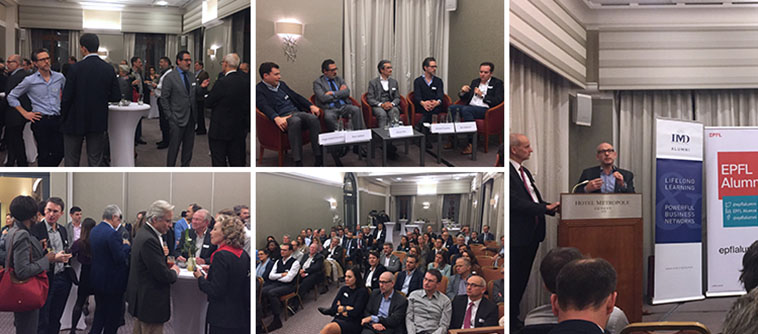
A storm is brewing in the traditional finance sector, with cryptocurrencies, blockchain, and startups like Revolut already posing a threat to the industry’s major players.
How should banks and other institutions adapt to this wave of disruption?
A panel of finance experts, organized by the Geneva alumni clubs of IMD and EPFL, gathered this week to discuss how companies can avoid being outstripped by these new arrivals, how fintech should be regulated and the prospect of incumbent organizations and innovators working together.
Here are some of the key takeaways from the meeting.
Technology, regulation, security
Banks and insurance companies are too complacent and must act fast if they want to survive, said Arturo Bris, IMD Professor of Finance and Director of the World Competitiveness Center, setting the scene for the discussion.
He believes that many functions in the finance industry can be carried out by blockchain, artificial intelligence, big data and machine learning.
“Banks and insurance companies risk being replaced as intermediaries between lenders and borrowers,” said Bris.
One of the main competitive advantages for countries in attracting fintech players will be regulation. “There will be a race to have good regulation for fintech. At the moment, Switzerland is winning,” he said, alluding to the country’s crypto valley in Zug.
Security is also at the heart of the future of fintech. This will be in part addressed by everyone having a digital identity – but that also comes with risk.
“Security will be about protecting my device. If you steal my device, you steal my identity,” said Bris.
Pace of change
Panellist Ben Robinson, quoting Ernest Hemingway, said change will happen “gradually and then suddenly.” Robinson is co-founder of Aperture, a strategy consultancy helping banks and consumer goods companies launch digital era business models.
Robinson believes banks won’t adapt quickly enough to fend off fintech disruptors and that the ‘network effect’ will define the sector.
“New types of institutions in banking grow super fast and it’s winner takes most. Large organizations tend not to change very quickly because you have so many barriers.”
Hugo Kowalewski Ferreira of Nucoro, the parent brand of Exo, an AI-powered wealth manager, agreed that technology would take some functions away from traditional finance, but for important milestones like buying a house and taking out a mortgage, customers will still want to deal with real people. Meanwhile, tech will empower advisors rather than replace them, he said.
Finance entrepreneur Vincent Trouche is also sceptical of complete disruption. For him, many new developments are simply the renaming of old concepts. “Tokenization is just a fancy name for the technology we use. You still own the same assets.”
Trouche also believes that the advantage any innovative player has is temporary. He cited Tesla – one of the first companies to commercialize the electric car – as an example. Today, long-established vehicle manufacturers like BMW have developed their own electric cars and Tesla’s position in the marketplace is not quite so revolutionary.
Brand power
Trouche also believes in the power of brands. “I pay with Revolut, but I let UBS manage my salary,” he said on how trust plays an important role in how people make financial decisions.
Rani Jabban, member of the Executive Committee of Arab Bank, thinks banks will partner with innovative fintech companies. Startups will be much better at the technology side and the banks can get back to their main role as safe keeping institutions. “Banks will have to change fast,” he said.
The panel was organized by Bertrand Mueller, President of the IMD Alumni Club of Geneva, and Patrick Pax, President of the EPFL Alumni Club of Geneva. It took place at the Hotel Metropole.
IMD and EPFL collaborate on many levels including a joint program on business and new technologies TransformTECH.


